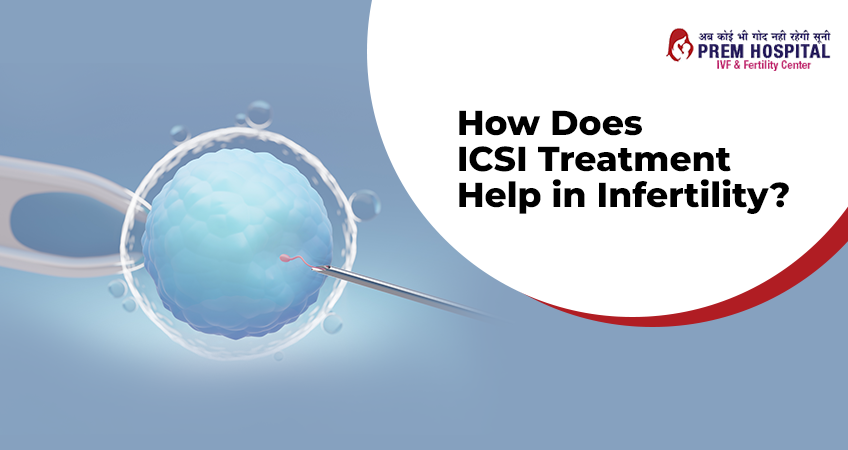Parenthood is the happiest transition that many couples experiences in their life. But unfortunately, few of them face trouble in conceiving and cannot experience such moments. This infertility problem may be present in any or both couples, or there might be any other reason which keeps them away from pregnancy.
Infertility is a term used for a condition when a couple cannot conceive even after having unprotected sex for a year. There are various treatments available to treat infertility, and one of them is Intracytoplasmic sperm injection (ICSI).
If you have trouble getting pregnant and want to know everything about the ICSI process, this blog is for you.
What Is Intracytoplasmic Sperm Injection Fertility Treatment?
Like the IVF process, in ICSI, sperm or eggs are collected from partners for fertilization. Instead of putting multiple sperm in an egg, only a single sperm is injected into the egg. Many fertility clinics recommend ICSI for every IVF cycle, while others reserve this process for critical infertility conditions. Till now, ICSI-IVF treatment has helped many couples to enter into parenthood.
When is ICSI needed?
There are certain issues in couples that can be resolved through ICSI treatment for pregnancy. Please check the below-mentioned problems:
- Low sperm count issue and thus unable to perform IUI or IVF.
- Poor sperm mobility, which implies sperm movement, is not usual.
- Your sperm may face problems while penetrating to egg or attaching to it.
- Blockage in the male reproductive organ, which restricts sperm from coming out.
- When your previous IVF cycle has failed.
- When you want to utilize previously frozen eggs.
- Uneven sperm shape.
The success rate of ICSI
Like any other infertility treatment, ICSI fertility treatment success rate depends on the patient’s age. Through ICSI treatment, 50-80% of eggs are usually fertilized, among which chances of success become 25%. The success rate depends on the patient to the patient, and hence it is hard to predict the exact success rate. Hence, you must decide to undergo ICSI treatment after proper consultation with your doctor.
ICSI procedure
Like the IVF procedure, in ICSI, the female will be given fertility medicines for ovary stimulation, developing multiple mature eggs for fertilization. Once the eggs are ready, your doctor will retrieve them through an outpatient process and freeze them for later use.
Also, the process of right sperm selection from semen will go hand-in-hand. After sperm selection, it will be injected into the egg. It will take around 5 days for an egg to fertilize and grow, which will happen in the lab. Later on, the embryo will be transferred into the woman’s uterus. A patient must wait after a successful embryo transfer, which involves a routine checkup to examine the fetus’s growth. All such process requires skilled doctors. Hence you must check the reputation of the clinic before undergoing the treatment. You can look for the best fertility hospital in Meerut for successful results.
The risk involved in ICSI treatment
Since the ICSI procedure is similar to IVF, it involves the same risk as IVF. Below are some risk factors involved:
- Congenital disabilities risk
- Genetic defect due to injection of weaker sperm.
Procedures before ICSI
Before the ICSI procedure, your doctor will collect the sperm and egg. Below are the steps for egg retrieval:
Ovulation induction
This woman will be given medication injections for 8-14 days. It will result in ovary stimulation to produce numerous eggs. Next, you will receive hCG injection for eggs to reach the final maturation stage.
Egg retrieval
Your doctor will do a transvaginal ultrasound to insert a thin needle through the vaginal wall into your ovaries. You will be given mild anesthesia, so this procedure will not be painful. The needle will contain a suction device for egg collection.
Sperm collection will be done on the same day of egg retrieval unless you are using frozen sperm. The sperm donor should abstain from masturbation 2-3 days before sperm collection. Also, sperm collection can happen in the clinic or at home. But the specimen should be given in the laboratory within 60 minutes of ejaculation.
What happens after ICSI?
After the procedure, your doctor will monitor the fertilized egg in the lab. After 5-6 days, an egg should split into cells to form a blastocyst. Your doctor will determine the size and cell mass of the blastocyst to know when it will lead to pregnancy.
An embryo transfer happens on the 5th or 6th day of egg retrieval. Through ultrasound, a long thin tube called a catheter is inserted into the vagina, and the embryo is injected into the uterus. For a successful pregnancy, the embryo should attach to the uterus. You must wait at least 2 weeks to check the success of the pregnancy.
Conclusion
ICSI is the last option your healthcare provider will suggest. Before undergoing the treatment, you must know the complete procedure and its associated risk. Also, you should inquire about the ICSI fertility treatment cost to set your budget accordingly.

